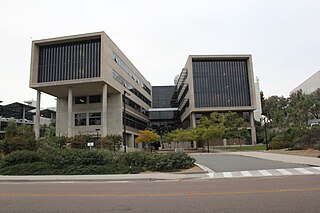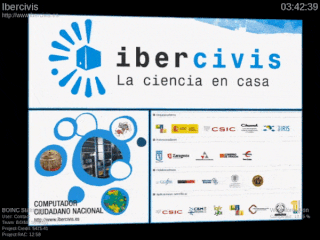
Bioinformatics is an interdisciplinary field of science that develops methods and software tools for understanding biological data, especially when the data sets are large and complex. Bioinformatics uses biology, chemistry, physics, computer science, computer programming, information engineering, mathematics and statistics to analyze and interpret biological data. The subsequent process of analyzing and interpreting data is referred to as computational biology.

The National Center for Biotechnology Information (NCBI) is part of the United States National Library of Medicine (NLM), a branch of the National Institutes of Health (NIH). It is approved and funded by the government of the United States. The NCBI is located in Bethesda, Maryland, and was founded in 1988 through legislation sponsored by US Congressman Claude Pepper.

Computational biology refers to the use of data analysis, mathematical modeling and computational simulations to understand biological systems and relationships. An intersection of computer science, biology, and big data, the field also has foundations in applied mathematics, chemistry, and genetics. It differs from biological computing, a subfield of computer science and engineering which uses bioengineering to build computers.
The National Institute of Arthritis and Musculoskeletal and Skin Diseases (NIAMS) is one of the institutes and centers that make up the National Institutes of Health, an agency of the United States Department of Health and Human Services (HHS).

The San Diego Supercomputer Center (SDSC) is an organized research unit of the University of California, San Diego (UCSD). SDSC is located at the UCSD campus' Eleanor Roosevelt College east end, immediately north the Hopkins Parking Structure.

In biology and other experimental sciences, an in silico experiment is one performed on a computer or via computer simulation software. The phrase is pseudo-Latin for 'in silicon', referring to silicon in computer chips. It was coined in 1987 as an allusion to the Latin phrases in vivo, in vitro, and in situ, which are commonly used in biology. The latter phrases refer, respectively, to experiments done in living organisms, outside living organisms, and where they are found in nature.
The Virginia–Maryland College of Veterinary Medicine is the veterinary school Virginia Tech and the University of Maryland, College Park - both of which are public research universities in the Commonwealth of Virginia and the State of Maryland, respectively.The college was created as a joint venture of the two universities and their respective state governments in order to fill the need for veterinary medicine education in both states. Students from both states are considered "in-state" students for admissions and tuition purposes.
Modelling biological systems is a significant task of systems biology and mathematical biology. Computational systems biology aims to develop and use efficient algorithms, data structures, visualization and communication tools with the goal of computer modelling of biological systems. It involves the use of computer simulations of biological systems, including cellular subsystems, to both analyze and visualize the complex connections of these cellular processes.
Carilion Clinic is a Roanoke, Virginia-based non-profit integrated health care organization. Carilion owns and operates seven hospitals in the western part of Virginia, such as Radford University Carilion, and a joint-venture medical school and research institute with Virginia Tech known as the Virginia Tech Carilion School of Medicine and Research Institute. The system consists of hospitals, primary and specialty physician practices, pharmacies, health clubs and other complementary services. Carilion has more than 13,200 employees with 737 physicians covering more than 70 specialties at 225 practice sites, making it the largest employer in the Roanoke Valley.

The Institute of Medical Science is an ancillary establishment of Tokyo University. It succeeded the Institute of Infectious Diseases established in 1892 and is the foremost institute for medical and bioscience research in Japan.

Sanford Burnham Prebys is a 501(c)(3) non-profit medical research institute focusing on basic and translational research, with major research programs in cancer, neurodegeneration, diabetes, infectious, inflammatory, and childhood diseases. The institute also specializes in stem cell research and drug discovery technologies.
Physiomics is a systematic study of physiome in biology. Physiomics employs bioinformatics to construct networks of physiological features that are associated with genes, proteins and their networks. A few of the methods for determining individual relationships between the DNA sequence and physiological function include metabolic pathway engineering and RNAi analysis. The relationships derived from methods such as these are organized and processed computationally to form distinct networks. Computer models use these experimentally determined networks to develop further predictions of gene function.
Igor I. Goryanin is a systems biologist, who holds a Henrik Kacser Chair in Computational Systems Biology at the University of Edinburgh. He also heads the Biological Systems Unit at the Okinawa Institute of Science and Technology, Japan.

Ibercivis was a volunteer computing platform which allows internet users to participate in scientific research by donating unused computer cycles to run scientific simulations and other tasks. The original project, which became operational in 2008, was a scientific collaboration between the Portuguese and Spanish governments, but it is open to the general public and scientific community, both within and beyond the Iberian Peninsula. The project's name is a portmanteau of Iberia and the Latin word civis, meaning 'citizen'.

The Vaccine Research Center (VRC), is an intramural division of the National Institute of Allergy and Infectious Diseases (NIAID), part of the National Institutes of Health (NIH), US Department of Health and Human Services (HHS). The mission of the VRC is to discover and develop both vaccines and antibody-based products that target infectious diseases.
PATRIC was a bacterial bioinformatics website from the Bioinformatics Resource Center, originally created in 2004. It has since been combined with the Influenza Research Database and the Virus Pathogen Database and Analysis Resource Center to create the Bacterial and Viral Bioinformatics Resource Center (BV-BRC). It is an information system that integrates databases and analysis tools. Its focus is on various data related to bacterial pathogens. PATRIC facilitates integration of various types of pathogen information to support biomedical research on bacterial infectious diseases.
COPASI is an open-source software application for creating and solving mathematical models of biological processes such as metabolic networks, cell-signaling pathways, regulatory networks, infectious diseases, and many others.
The College of Science at Virginia Tech contains academic programs in eight departments: biology, chemistry, economics, geosciences, mathematics, physics, psychology, and statistics, as well as programs in the School of Neuroscience, the Academy of Integrated Science, and founded in 2020, an Academy of Data Science. For the 2018-209 academic year, the College of Science consisted of 419 faculty members, and 4,305 students, and 600 graduate students The college was established in July 2003 after university restructuring split the College of Arts and Sciences, established in 1963, into two distinct colleges. Lay Nam Chang served as founding dean of the College of Science from 2003 until 2016. In 2016, Sally C. Morton was named dean of the College of Science. Morton served in that role until January 2021, when she departed for Arizona State University and Ronald D. Fricker—senior associate dean and professor in the Department of Statistics—was named interim dean of the College. In February 2022, Kevin T. Pitts was named the named the third official dean of the College of Science.

Complex and Adaptive Systems Laboratory (CASL) is an interdisciplinary research institute in University College Dublin. It is formed around four research clusters. The institute houses research groups from a number of Schools within UCD, notably computer science. It is located in the Belfield Business Park at the northern end of the main UCD campus. The institute is involved in all aspects of research into complex systems from atomistic models, through to societal modelling.

Caitlin M. Rivers is an American epidemiologist who as Senior Scholar at the Johns Hopkins Center for Health Security and assistant professor at the Johns Hopkins Bloomberg School of Public Health, specializing on improving epidemic preparedness. Rivers is currently working on the American response to the COVID-19 pandemic with a focus on the incorporation of infectious disease modeling and forecasting into public health decision making.












